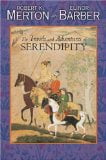 The Travels and Adventures of Serendipity: A Study in Sociological Semantics and the Sociology of Science
The Travels and Adventures of Serendipity: A Study in Sociological Semantics and the Sociology of Science
by Robert K Merton and Elinor Barber
Princeton University Press, £12.50 (pb), ISBN 0-691-11754-3
This unusual book was written in 1958 and published in Italian in 2002 and in English, its original language, in 2004. It really falls into three parts, although the first two are not formally separated. The first seven chapters give an enormously erudite history of the word “serendipity” and of changing uses of it and attitudes to it. It was invented in 1754 by Horace Walpole, but used by him, as far as can be discovered, only once, in a letter. It languished in obscurity until the late 19th century when it was rediscovered, and gradually came into first specialized and then general use. Walpole’s meaning was: “making discoveries, by accidents and sagacity, of things which they [i.e. people] were not in quest of”. His examples, however, involve drawing correct conclusions from small indications, rather like Sherlock Holmes (as the authors point out), or like the ‘abduction’ of C S Peirce (as they don’t).
The last three chapters and two long Notes discuss the implications of chance discoveries in general, and in science in particular. This is done largely by quoting scientists and others who have thought about the matter. Some think chance very important, others less so, which is interesting but inconclusive. Finally a longish (68 pp) Afterword by Robert Merton, Elinor Barber having already died, as he did soon after, explains how their interest began, and further discusses the role of chance. He explains that he has left the original text, as a kind of time capsule reflecting views of 1958. But this of course applies to any book.
I suspect that reactions will vary, not “like it or loathe it” but rather on a dimension from delight to irritation or boredom, but quite heavily skewed to the positive end. The actual writing is most enjoyable, and the impression is of immense but lightly carried humane scholarship. Perhaps no other single word has ever been explored like this.
John Radford

